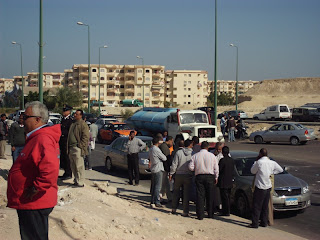In the past few days, I have heard of three separate incidences in Hurghada of a child being kidnapped. A parents worst nightmare, the apparent increase is prompting many residents to question what is going on. Parents are advising not to allow children out into the streets to play, to avoid certain areas, and to never leave your children out of your sight.
Last April, headlines in Egypt were dominated with the trend when the grandniece of the late Anwar al-Sadat, 12 year old Zeina Effat al-Sadat, was kidnapped. Zeina was released almost 24 hours later, following negotiations between the kidnappers and her family and a 5 million LE ransom sum paid. Her story points to the increasing trend in Egypt of kidnapping for profit.
"As a sign of Egypt's deteriorating security conditions, child abductions have become an easy way for criminals to make money," security expert and former policeman Maher Zakhary told IRIN.
The family members of richer, more affluent Egyptians are being targetted with the kidnapper's sole agenda being the ransom payment. Kidnappings in and around the greater Cairo area, particularly from areas such as Heliopolis, would appear to fall into this category. But they stand out; the ransom request usually promptly follows the kidnapping.
I
reported in this blog last year on the case of Soraya Dierich, who to this day remains "missing." Soraya's story is indicative of another common form of kidnapping in Egypt. The case of an Egyptian man marrying a foreign woman, bearing a child together, and once the relationship sours the man kidnaps the child and disappears. Soraya is the child of such an unfortunate situation, and was kidnapped by her father in May of 2011. Sadly the incidences of kidnappings like this are becoming so commonplace, the
US Department of State has clear guidelines for parents facing these issues. Stressed in the document are Egyptian custodial laws, which will generally favor the mother if she is an Egyptian citizen, and / or Muslim. Otherwise custodial rights will often fall to the father, and in the eyes of the Egyptian legal system, he may claim the parental rights to his children. In cases like Soraya with a foreign mother, her alleged kidnapping is complicated by the fact that in the eyes of most Egyptians, the father has done nothing wrong.
But the recent spat of kidnappings in Hurghada cannot be as clearly defined as the two incidents above.
 |
| Omar, kidnapped in Hurghada |
The first story surfaced on the 12th of April, with reports of 1 year old Omar being kidnapped from the popular Villages Road area. Omar's mother, an Egyptian woman, left him with a foreign woman outside the coffee shop Arabesque to take her daughter to the toilet. When she returned, Omar had disappeared without a trace. The last description of the foreign woman, as has been
issued by the mother, was:
"the woman that took omar has the birthmark on the right wrist. It has the shape of a coin and is dark brown. She is between 30 and 40 years old, around 170cm to 180cm tall, medium build, a little bit a long chin, dark brown hair till the shoulder. Her eyes are blue or green, she is not sure because of the red sunglasses. She was wearing a white bermuda and a pink blouse. Her daughter is around 2 years light brown hair till the shoulder. She was wearing a bleu jeans skirt and a red tshirt with yellow lines in front. The women was talking arabic with a foreign accent."
When I first read this story, my initial reaction was "how could a mother possibly leave her child with a stranger." The common reaction appears to be that women in Egypt previously had nothing to fear from leaving their children with strangers, as children are so coveted here they were generally always safe. Perhaps I'm just too cynical having grown up outside of this country to expect a stranger will safely watch my child.
It wasn't long after the story of Omar was circulated, that reports of another child's kidnapping surfaced. Snatched on the 11th of April, 7 year old Yousef Ahmad al-Sawi was taken in Hurghada. The poster below has been hung up in mosques and local supermarkets in the attempts to locate him.
Sadly when it comes to preventing or protecting children from these instances of kidnapping, strict parental vigilance is the best way forward. Hani Helal, the secretary-general of the Egyptian Coalition on Children's Rights,
said "the government does not attach enough importance to the problems suffered by children. This leads to increasing violations against the children."
Helal further claimed that if the Egyptian government does not work to improve the security of children in Egypt, he will resort to the UN.
So why are these children being snatched if there isn't an obvious ransom or custodial battle being played out? The answer it seems, is either human trafficking, sexual exploitation, trade in body organs, or criminal activity.
Such was the situation for Hayam Rabie, who's 1 year old daughter went missing after Rabie left her with neighbours while she ran errands. Upon her return, her daughter was gone without a trace. It was later uncovered that one of Rabie's neighbours had kidnapped the child. Evidence uncovered in her neighbours flat revealed blood bags, IVs, and other medical equipment, pointing to an ominous conclusion. Rabie's daughter remains missing.
Is this a new phenomenon as many media outlets are reporting? Is this really the new trend of security in Egypt in the post-revolution vacuum? While most stories are attributing this rise in kidnapping to the police's inability to do anything about it, the sadder truth may in fact be that this has been a long standing tradition, but up until recently the media has not felt the need to report on the circumstances. In previous years many of the children kidnapped were snatched from the remote and poorest areas in Egypt; their stories were just not considered newsworthy.
As Hafez Abu Saeda, secretary-general of the Egyptian Organisation for Human Rights, a Cairo- based NGO, told
IPS in 2009, "In most cases, children are kidnapped for use in criminal gangs - gangs of beggars, thieves or drug dealers - or for prostitution and sexual exploitation," he said. "Of course, many cases are simply children running away from home due to domestic problems, or the result of a personal vendetta - not uncommon in the Egyptian countryside."
Fediya Abu Shohba, professor of criminal law at the Cairo-based National Centre for Social and Criminal Research, agrees with Abu Saeda, and in the same article states:
"The disappearance of children has proliferated over the last five years, but has become especially acute over the course of the last year [2009]," Abu Shohba told IPS. "And when a child disappears - and doesn't come back - it usually means they have been kidnapped.
"The prevalence of the phenomenon can be attributed to several, mainly social, factors," she says. "These include an increase in the number of vulnerable children living on the street, decreasing parental care due to economic pressures, the erosion of traditional religious values, and the promotion of violence and crime by the mass media."
So although it would appear that these kidnappings are not a new and developing trend, it does not lesson the gravity of the situation. Parents are being advised to keep constant watch on their children and to never leave them unattended. A hotline has been set up to receive reports of kidnapping which they claim have risen in the post-revolution times to 6 or 7 calls a day. [
Despite researching this, I have been unable to find the number for this hotline.] Preventative measures are the only way to ensure the safety of your child; only you can help stop this rising trend of kidnappings.


































